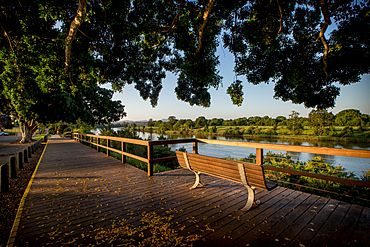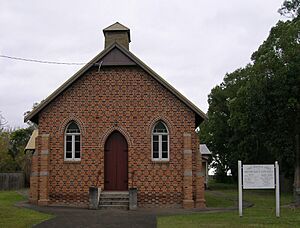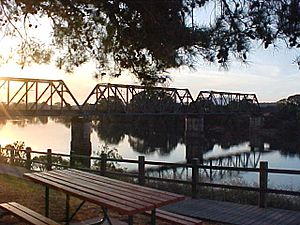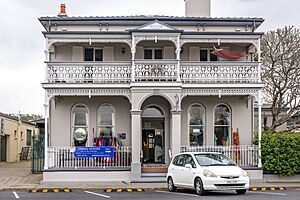Wauchope, New South Wales facts for kids
Quick facts for kids WauchopeNew South Wales |
|
|---|---|

View of the Hastings River from River Street in Wauchope.
|
|
| Established | 1836 |
| Postcode(s) | 2446 |
| Elevation | 20 m (66 ft) |
| Location |
|
| LGA(s) | Port Macquarie-Hastings Council |
| County | Macquarie |
| State electorate(s) | Oxley |
| Federal Division(s) | Lyne |
Wauchope (pronounced war-hope) is a friendly town in the Mid North Coast area of New South Wales, Australia. It's part of the Port Macquarie-Hastings Council region. Wauchope sits inland on the Hastings River, about 19 km (12 mi) west of Port Macquarie. The town is also about 383 km (238 mi) north of Sydney, the state capital.
Wauchope is famous for Timbertown, a fun theme park that shows what life was like when the timber industry was huge here. This industry helped Wauchope grow a lot in its early days. The town is also important for the dairy industry in the Hastings Valley. About 7,500 people live in Wauchope and its nearby areas.
Contents
History of Wauchope
The Birpai people, also known as Birrbay, have lived in this land for over 40,000 years. They are the traditional owners of the area.
How Wauchope Got Its Name
By 1828, people started getting land grants along the Hastings River. The town of Wauchope began in 1836. That year, Captain Robert Andrew Wauch bought a large piece of land. He built a house called Wauch House.
Robert Wauch passed away in 1866. The government then officially named his properties "Wauchope". When a post office opened nearby in 1881, it was also called Wauchope. However, there was a mistake, and it was printed as "Wanghope" until 1889.
The family who owned the land pronounced their name 'war-cope'. But the town's name is commonly pronounced 'war-hope'.
Floods in Wauchope
The Hastings River, which runs through Wauchope, has experienced several big floods. The largest flood ever recorded happened on January 13, 1968. The water level reached 9.1 meters (30 ft) high. This flood was considered a very rare event.
Another major flood happened in March 1894, reaching 8.9 meters (29 ft). Other big floods occurred in 1950, 1929, 1864, and 1963. Even in February 2013, floodwaters peaked at 7.22 meters (23.7 ft) after heavy rain.
Industry and Economy
Wauchope's main industry used to be timber. At one point, more timber was sent out from Wauchope than any other town in Australia. Timber from a local sawmill was even used to build the famous Sydney Opera House!
Modern Industries
Today, Wauchope's economy mostly relies on farming and tourism. Many people also live here and work in the bigger town of Port Macquarie nearby. Wauchope and its surrounding areas are becoming known for delicious local foods. These include cheeses, wines, and organic fruits and vegetables.
You can find many of these local products at the Hastings Farmers Markets. They are held at the Wauchope Showground on the fourth Saturday of every month.
Tourist Attractions
Timbertown is the most famous tourist spot in Wauchope. It's like stepping back in time to a colonial village. You can see old displays and fun attractions. These include a working steam train, a bullock team (oxen pulling carts), and a Cobb and Co stage coach.
For twenty years, there was a huge statue called the Big Bull between Wauchope and Port Macquarie. It was a popular tourist stop but was removed in 2007.
Other interesting places to visit include the local historical society and old buildings. You can also explore Broken Bago vineyards and beautiful natural areas. These include state forests and Bago Bluff National Park.
The Wauchope railway station is a key transport hub. People travelling to nearby coastal towns like Port Macquarie often use it to connect to trains.
| Historical population | ||
|---|---|---|
| Year | Pop. | ±% |
| 1954 | 2,498 | — |
| 1961 | 3,038 | +21.6% |
| 1966 | 3,173 | +4.4% |
| 1971 | 3,357 | +5.8% |
| 1976 | 3,525 | +5.0% |
| 1981 | 3,645 | +3.4% |
| 1986 | 4,181 | +14.7% |
| 1991 | 4,297 | +2.8% |
| 1996 | 4,693 | +9.2% |
| 2001 | 4,759 | +1.4% |
| 2006 | 5,503 | +15.6% |
| 2011 | 6,372 | +15.8% |
| 2016 | 6,881 | +8.0% |
| 2021 | 7,982 | +16.0% |
| Source: Australian Bureau of Statistics data. | ||
Town Layout
Wauchope is built along the southern bank of the Hastings River. Behind the town, you can see the beautiful Bago Mountain.
Main Streets
High Street is the main street, which is part of the Oxley Highway. It runs through the town from east to west. Here you'll find local shops and banks. The post office is at the corner of Hastings Street. Further along High Street is the town clock. This clock reminds people that Wauchope used to be the center of the Hastings Shire local government.
Cameron Street is another important street that crosses High Street. The Hastings Hotel and Star Hotel are on Cameron Street. The RSL club is also nearby. Cameron Street leads down to the Hastings River. There used to be a wharf here to ship goods, but it's gone now.
Other Areas
South of the main shops is the Wauchope Golf Course and Country Club. It's right in the middle of town. Further west, you'll find Timbertown, which is next to large areas of forest leading to the Bago Mountain region.
East of the main shopping area is the railway line from Sydney. The Hastings dairy and milk factory is close to where the railway line crosses the Hastings River.
Schools in Wauchope
Wauchope has several schools for local students:
- Wauchope Public School
- St Joseph's Primary School
- Wauchope High School
Transport
Wauchope has its own railway station on the North Coast Line. Six NSW TrainLink trains stop here each day. Three trains go south to Sydney, and three go further north to Grafton, Casino, and Brisbane. Passengers can also catch connecting buses from the station to nearby Port Macquarie.
Famous People from Wauchope
Many talented people have come from Wauchope:
- Bill Bain – An Emmy award-winning TV director.
- Iva Davies – A musician from the band Icehouse.
- Rhali Dobson – A W-League footballer for Melbourne City.
- Angus Gill – A musician.
- Phil Jamieson – A musician from the band Grinspoon.
- Allison Langdon – A well-known television presenter and journalist.
- Mark Laurie – A former rugby league player.
- Robert Laurie – A former rugby league player.
- Ian Schubert – A former rugby league player.
Sister City
Wauchope has a special connection with another town far away. It is a sister city with:





